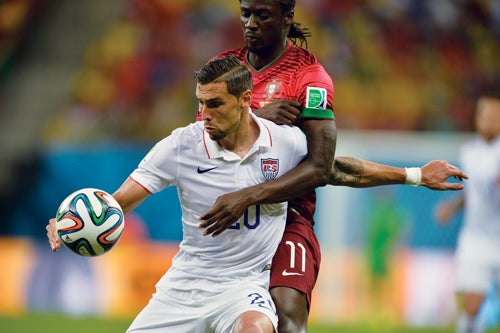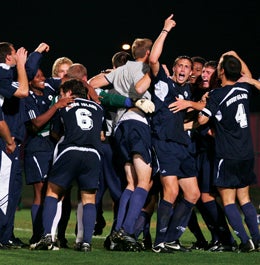Goal Oriented
 When Ram Geoff Cameron got a nod from MLS’s Houston Dynamo during his senior year, it kicked off a seven-year run that would take him, by way of England, all the way to Brazil and his childhood dream: the World Cup. There, he proved himself a versatile member of the US Men’s National Team 2014 defense roster.
When Ram Geoff Cameron got a nod from MLS’s Houston Dynamo during his senior year, it kicked off a seven-year run that would take him, by way of England, all the way to Brazil and his childhood dream: the World Cup. There, he proved himself a versatile member of the US Men’s National Team 2014 defense roster.
So what now, after the Attleboro, Mass., native has played on one of the world’s biggest sporting stages?
Naturally, he’s set his sights on the 2018 World Cup. But he finds time to hang with family, go shark fishing with college buddies (“Catch and release, relax”) and answer questions—thousands of them, including plenty at URI head coach Gareth Elliott’s summer soccer camp. In fact, he skipped a seat at the ESPYs to do just that (see video below). Here, he tells us why.
When was the first time you pulled on a USA jersey?
My first cap was in Tampa in 2010, against El Salvador, during the last few minutes of the game. That had been a dream of mine since I was a little kid. I get chills thinking about it.
Describe the time leading up to the World Cup.
You have to make sure you’re focused for every single match. If you have a couple bad games, you’re not gonna be called in for the next one.
Were you guys aware of the immense support here?
We were getting tons of messages from friends and family. We’d try to stay away from distractions, but seeing all those pictures of people celebrating in U.S. colors—that was inspiring.
What was the World Cup like?
It’s hard to explain. The glamour, the attention, the pride that you feel for your country—it was super, super cool. I mean, the whole country of Brazil basically shut down for a month.
So much was said about the “Group of Death.” How did it feel to get to the Round of 16?
Yeah, no one thought we were gonna get a point from Portugal or three points from Ghana. Just the fact that we went down there and turned a lot of heads… When you see players from England tweeting “I’ve become a U.S. soccer fan,” that’s pretty crazy. People respect us as a soccer nation now.
What is it like being part of that?
It’s huge. American sports are all fighting against one another—we have baseball, basketball, football, hockey, and soccer. In many other countries, it’s just soccer. That’s where their most talented athletes are, and that’s who we’re competing against.
Tell us about the factors that led to the team’s success.
You’ve seen it in movies like Miracle—when teams just come together. Individually, they may not be the most talented players, but if they work hard and support each other, they create this team chemistry and unbreakable bond. We had that, so it was easy to stay on the same page.
You played well in the opener against Ghana, but were criticized for your play against Portugal. How do you deal with that?
I knew I made a crucial mistake on that first goal, and I held my hand up to say it. People tried to criticize me for the second goal, but I think they don’t really understand the game. We lost a ball in the midfield, it was mistake after mistake and, because I’m a defender, I was the last person to try to prevent the shot. It’s a team game though, and things happen. You just have to block out the negativity, and try not to let it affect you.
What lies ahead?
Right now, I’ve got the English Premier League season with Stoke City. For the national team, my goal is the Gold Cup, then there’s Copa America, then there’s qualifying for the next World Cup in Russia. I’m excited and anxious. I wish the World Cup was next year because you get that feeling once, and you don’t want it to be the last time.
So you aren’t buying the talk that you’ll be too old in 2018?
Nah. I’ll be 32. There were players in our group this year who are that age and they’re very, very good.
How has your career as a professional athlete changed you?
It’s shown me the importance of appreciating the things I have—and the dangers of taking things for granted. This isn’t an ordinary career. It lasts for as long as your body holds up. So you really have to take care of yourself.
I’m also living in the public eye now. Twitter and Facebook and Instagram—all those things allow you to let people into your life and bring them on the ride with you. You share pictures because people want to see you doing everyday things. It shows that hey, I’m not any different.
It must take a little getting used to.
For sure. One thing I learned, though, is that you never forget where you grew up and where your parents are, where you learned all of the things that got you to where you are today. It’s important not to forget those things.
You haven’t. Somehow you always find your way back to campus.
 When I transferred from West Virginia, who would have thought I would be the Atlantic 10 Midfielder of the Year? That eventually led to me getting drafted by Houston… This place and these people are part of the puzzle. They pushed me and kept me hungry. They still keep me grounded.
When I transferred from West Virginia, who would have thought I would be the Atlantic 10 Midfielder of the Year? That eventually led to me getting drafted by Houston… This place and these people are part of the puzzle. They pushed me and kept me hungry. They still keep me grounded.
So it’s good to come back and say thank you. I love this soccer program and want it to do well. I’m proud of URI, and it’s awesome to see my coaches working with young players at camp, doing the same things they did with me. I hope one day another Ram will follow a similar path. That would be really cool, to think I might have inspired someone to think, “Hey, he did it. Maybe I can too.”
One last thing: Can you explain the growing fascination with your haircut?
It’s funny, because it started happening over in England, and now people are Instagramming pictures and asking, “Where do you get this haircut?” My barber in England calls it the G-Cam. It’s a nice little comb over, slicked back with a bit of hair product.
—In conversation, edited for length, with Jodi Pontbriand
 Home
Home Browse
Browse Close
Close Events
Events Maps
Maps Email
Email Brightspace
Brightspace eCampus
eCampus


